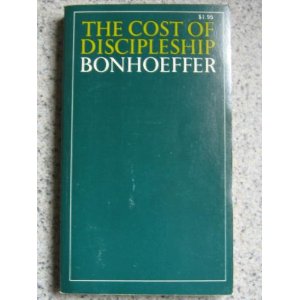Bonhoeffer Cost Discipleship Study Guide
SCRIPTURE AND MYTH IN DIETRICH BONHOEFFER. A Guide to the Sources. Including The Cost of Discipleship, Bonhoeffer stood on the Bible as on a breaking.
Discipleship by Dietrich Bonhoeffer Discipleship by Dietrich Bonhoeffer is the fourth book in the Dietrich Bonhoeffer Works series created by the Dietrich Bonhoeffer Society. Contains two parts. Both parts extend his continuing thought about Christ in the midst of the church community. Early in the book, Bonhoeffer defines the purpose of discipleship (40): “Discipleship is joy.” In Part One (which is untitled although Bonhoeffer elsewhere called it “Discipleship in the Synoptics”), Bonhoeffer introduces the idea of discipleship as costly grace (chapter 1), and then explains the call to discipleship (chapter 2). Bonhoeffer emphasizes the importance of simple obedience in discipleship (chapter 3), discipleship and the cross (chapter 4), and the importance of discipleship for the individual (chapter 5). Bonhoeffer takes the time to interpret the Sermon on the Mount in Matthew 5-7 (chapter 6).
Bonhoeffer says that each chapter is related to discipleship. Matthew 5 shows the extraordinariness of discipleship.
Matthew 6 gives the hidden simple righteousness of discipleship. Matthew 7 reveals the lost neighbor and the disciple.
Bonhoeffer follows this with a commentary on Matthew 10 (chapter 7). He interprets the chapter as a call to the work of discipleship, which is sharing the gospel. He emphasizes the role of each person involved in harvest work and its connection to discipleship. Bonhoeffer states (187-188): “ God ’s works cannot be done without God’s commission; otherwise, they would be done without God’s promise.
- Costly Grace: A Contemporary View of Bonhoeffer's The Cost of Discipleship. (25) Most Christians go to church a couple of hours a week, go to a Bible study,.
- Feb 17, 2012 - 'Dietrich Bonhoeffer directed an illegal seminary for two and a half years until it was. Developed his classic work The Cost of Discipleship ' (CH&B #32). Our study of riches has arguably pointed us in the direction of greater.
But does this promise and commission to preach the gospel not apply everywhere? Both only apply where God has given the commission.”.
Bonhoeffer warns that even people who are not saved can do the work of the Gospel (187): “ The fact that even Judas went out to do the work of Christ remains for us an inscrutable dilemma and a terrible warning.” B onhoeffer uses Part Two (“The Church of Jesus Christ and Discipleship”) to connect discipleship and the mission of the church. He addresses different questions (chapter 8) and then describes the importance of baptism (chapter 9), the body of Christ (chapter 10), the visible church community (chapter 11), and the saints and the governance of the church (chapter 12). He ends the book with a challenge for Christians to the image of Christ (chapter 12). As Bonhoeffer states: “ The follower of Jesus is the imitator of God.
“Therefore be imitators of God, as beloved children” (Ephesians 5:1).”. T he quotable Bonhoeffer continues throughout this book. Here are a set of quotes which I found interesting: “ C heap grace is the m ortal enemy of our church.
Our struggle today is for costly grace.” (43) “ Cheap grace is preaching forgiveness without repentance; it is baptism without the discipline of community; it is the Lord ’s Supper without confession of sin; it is absolution without personal confession. Cheap grace is grace without discipleship, grace without the cross, grace without the living, incarnate Jesus Christ” (44) “ Without discipleship, costly grace would become cheap grace.” (50) “ A change has to come about by calling people to obedience: only the obedient have faith!” (69) “ Daily the disciples receive this certainty anew from their communion with Jesus Christ, who is the fulfillment of all their petitions.” (157-158) “It is the goods of the world which try to turn away the hearts of Jesus’ disciples.” (163) “ The disciples always see only Christ. They do not see Christ and the law, Christ and piety, Christ and the world. They do not even begin to reflect that; they just follow Christ in everything.” (163) “If God provides for my today, He will just as much provide for my tomorrow.” (165) “Judging others makes us blind, but love gives us sight.” (172).
Overall, I enjoyed this book. I found that Bonhoeffer has clearly been developing a thread which he started with Sanctum Communio, and Act and Being. He has continued to show in this book Discipleship the importance of following Christ, and its central importance in the mission of the church. While he touches on these ideas in Sanctum Communio and Act and Being, Bonhoeffer fleshes out his theology in Discipleship.
Discipleship is easier to read than his previous books. At the same time, the book will challenge the Christian to grow to be more like Christ. Discipleship would also be a great book for small group or Sunday School study. The book challenges not just individuals but also the church. Bonhoeffer challenges Christians to be real followers of Christ, not just fans of Him. Bonhoeffer also challenges the church to make following Christ the central church growth strategy.
Bonhoeffer wrote this book during the Nazi regime of 1930s Germany. His message is just as important now in twenty-first century world as it was then.
Publication date The Cost of Discipleship is a book by the German Theologian, considered a classic of Christian thought. The original German title is simply Nachfolge (literally: 'following' or: 'the act of following'). It is centered on an exposition of the, in which Bonhoeffer spells out what he believes it means to follow Christ. It was first published in 1937, when the rise of the was underway in Germany and it was against this background that Bonhoeffer's theology of costly discipleship developed, which ultimately led to his death.
Contents. Summary One of the most quoted parts of the book deals with the distinction which Bonhoeffer makes between 'cheap' and 'costly'. According to Bonhoeffer, cheap grace is the preaching of forgiveness without requiring repentance, without church discipline.
Cheap grace is grace without, grace without the cross, grace without Jesus Christ. Cheap grace, Bonhoeffer says, is to hear the gospel preached as follows: 'Of course you have sinned, but now everything is forgiven, so you can stay as you are and enjoy the consolations of forgiveness.' The main defect of such a proclamation is that it contains no demand for discipleship. In contrast to cheap grace, costly grace confronts us as a gracious call to follow Jesus, it comes as a word of forgiveness to the broken spirit and the contrite heart. It is costly because it compels a man to submit to the yoke of Christ and follow him; it is grace because Jesus says: 'My yoke is easy and my burden is light.' Bonhoeffer argues that as spread, the Church became more 'secularised', accommodating the demands of obedience to to the requirements of society.
In this way, 'the world was Christianised, and grace became its common property.' But the hazard of this was that the was cheapened, and obedience to the living Christ was gradually lost beneath formula and ritual, so that in the end, grace could literally be sold for monetary gain. But all the time, within the church, there had been a living protest against this process: the movement. This served as a 'place where the older vision was kept alive.' Unfortunately, 'monasticism was represented as an individual achievement which the mass of the laity could not be expected to emulate'; the commandments of Jesus were limited to 'a restricted group of specialists' and a double standard arose: 'a maximum and a minimum standard of church obedience.'
Discipleship Study Guide
This was dangerous, Bonhoeffer says, because whenever the church was accused of being too worldly, it could always point to monasticism as 'the opportunity of a higher standard within the fold - and thus justify the other possibility of a lower standard for others.' So the monastic movement, instead of serving as a pointer for all Christians, became a justification for the status quo. Bonhoeffer remarks how this was rectified by at the, when he brought Christianity 'out of the cloister.' However, he thinks that subsequent generations have again cheapened the preaching of the forgiveness of sins, and this has seriously weakened the: 'The price we are having to pay today in the shape of the collapse of the organised church is only the inevitable consequence of our policy of making grace available to all at too low a cost. We gave away the word and sacraments wholesale, we baptised, confirmed, and absolved a whole nation without condition. Our humanitarian sentiment made us give that which was holy to the scornful and unbelieving. But the call to follow Jesus in the narrow way was hardly ever heard.'
Influence has argued that Bonhoeffer's writings, which culminated in the Ethics and Letters and Papers from Prison, form a seamless continuity, stretching back at least as far as The Cost of Discipleship. Unlike Bonhoeffer's later writings, The Cost of Discipleship has been widely read by both conservative and liberal Christians and is still read and quoted today. The term 'cheap grace' was coined by The, then-pastor of in Harlem, NY.
Bonhoeffer attended the church when at, and for a season taught Sunday School there. Bonhoeffer benefited from the protest culture of the African American church and gleaned from it social gospel elements that he would take with him back to Germany. The anti-temporal power ethic would aid him to resist the Nazi regime. The notion of cheap grace has been used by to criticize the increasing dominance of the over the coupled with what he saw as an increasing disregard within the party for other values: But there is another, uniquely religious aspect that also comes into play: the predilection of fundamentalist denominations to believe in practice, even if not entirely in theory, in the doctrine of “cheap grace,” a derisive term coined by the theologian Dietrich Bonhoeffer. By that he meant the inclination of some religious adherents to believe that once they had been “saved,” not only would all past sins be wiped away, but future ones, too—so one could pretty much behave as before. Cheap grace is a divine get-out-of-jail-free card.
Spiritual Discipleship Study Guide
Hence, the tendency of the religious base of the Republican Party to cut some slack for the peccadilloes of candidates who claim to have been washed in the blood of the Lamb and reborn to a new and more Christian life. The religious right is willing to overlook a politician’s individual foibles, no matter how poor an example he or she may make, if they publicly identify with fundamentalist values. Similarly, Katelyn Beaty of warned against the Christian use of cheap grace in excusing powerful men guilty of sexual assault. References. Mike Lofgren. Retrieved 2016-05-29. Beaty, Katelyn.

Bonhoeffer Discipleship Study Guide

New York Times. Bibliography. Bethge, Eberhard.
Dietrich Bonhoeffer, Man of Vision, Man of Courage. New York: Harper & Row, 1970. BX 4827.B57B43. Bonhoeffer, Dietrich. The Cost of Discipleship.
New York: Macmillan, 1966. BT 380.B66 1966.
Bonhoeffer, Dietrich, Eberhard Bethge, ed. New York: Macmillan, 1955. BJ 1253.B615 1955a. Bonhoeffer, Dietrich, Eberhard Bethge ed. Letters and Papers from Prison.

New York: Macmillan, 1972, c1971. BX 4827.Ba. De Gruchy, John W. The Cambridge Companion to Dietrich Bonhoeffer. New York: Cambridge University press, 1999.
BX4827.B. Feil, Ernst. The Theology of Dietrich Bonhoeffer. Philadelphia: Fortress Press, 1985. BX 4827.B57F4413 1985.
Floyd, Wayne Whitson Jr., ed. Theology and the Practice of Responsibility: Essays on Dietrich Bonhoeffer. Valley Forge, PA: Trinity Press International, 1994. BX 4827.B. Woelfel, James W.
Bonhoeffer’s Theology: Classical and Revolutionary. Nashville: Abingdon Press, 1970. BX 4827.B57W6 1970. Clingan, Ralph Garlin.
'Against Cheap Grace in a World Come of Age.' Peter Lang Publishing Co.